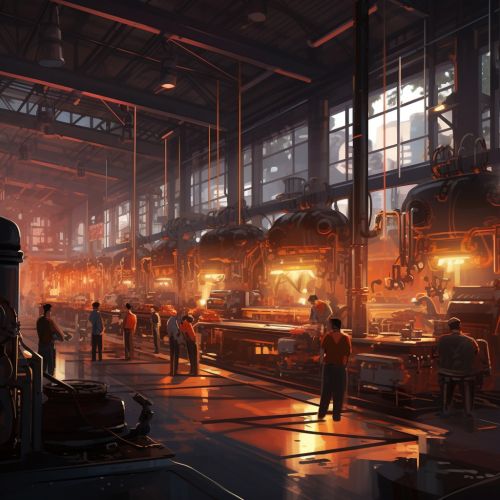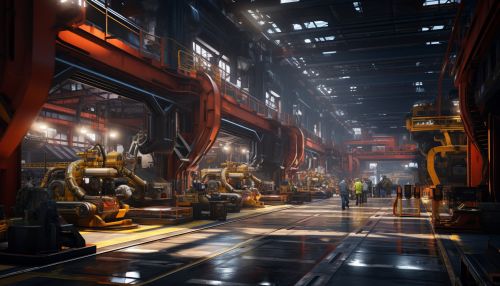Manufacturing
Overview
Manufacturing is the production of goods for use or sale, using labor, machines, tools, and chemical or biological processing or formulation. It is the essence of secondary industry. The term may refer to a range of human activity, from handicraft to high-tech, but is most commonly applied to industrial design, in which raw materials from primary industry are transformed into finished goods on a large scale.
History
The history of manufacturing can be traced back to the start of the Industrial Revolution. The transition from manual production methods to machines, new chemical manufacturing and iron production processes, the increasing use of steam power and water power, the development of machine tools and the rise of the mechanized factory system marked the transformation of the manufacturing industry. The Industrial Revolution led to a rapid increase in the rate of production and distribution of manufactured goods read more.
Types of Manufacturing Systems
There are several types of manufacturing systems that are used in different industries. These include:
- Job Production: Also known as one-off production, this system is used when a product is produced with the labor of one or more workers, in its entirety, before moving on to produce the next product. This method is used when customers order products to their own specification.
- Batch Production: This system is used when many similar items are produced together. Each batch goes through one stage of the process before moving onto the next stage.
- Flow Production: Also known as mass production, this system is used when the product is made up of many identical items. The items move continuously through the production process.
- Just-In-Time: This system is used in lean manufacturing processes. It is a production model in which items are created to meet demand, not created in surplus or in advance of need.
Manufacturing Processes
Manufacturing processes are the steps through which raw materials are transformed into a final product. The manufacturing process begins with the product design, and materials specification from which the product is made. These materials are then modified through manufacturing processes to become the required part.
- Casting and Molding: This process involves heating a metal to its melting point and then pouring it into a mold to create a particular shape.
- Forming: This process involves the use of force such as pressure and heat to manipulate material into a final shape.
- Machining: This process involves the removal of material from the workpiece, usually by means of a cutting tool.
- Joining: This process involves the joining of parts together to create a final product.
- Additive Manufacturing: Also known as 3D printing, this process involves the addition of material layer by layer to create a product.
Manufacturing Industries
Manufacturing industries are those that engage in the transformation of goods, materials or substances into new products. The raw materials are transformed into finished products through a set of production processes. These industries are categorized based on their primary output.
- Automotive Industry: This industry is primarily involved in the design, development, production, marketing and selling of motor vehicles read more.
- Chemical Industry: This industry is involved in the production of industrial chemicals. They convert raw materials (oil, natural gas, air, water, metals, and minerals) into more than 70,000 different products read more.
- Electronics Industry: This industry is involved in the production of electronic devices and components such as semiconductors, printed circuit boards, and other electronic equipment read more.
- Food Industry: This industry is involved in the processing of raw food materials, packaging, and distribution of the finished food products read more.
- Textile Industry: This industry is involved in the production of yarn, cloth and clothing. The raw materials used in the textile industry are cotton, wool, silk and synthetic fibers read more.
Manufacturing Technology
Manufacturing technology provides the tools that enable the production of all manufactured goods. These master tools of industry magnify the effort of individual workers and give an industrial nation the power to turn raw materials into affordable, quality goods essential to today’s society.
- Computer Numerical Control (CNC): CNC machines are electro-mechanical devices that manipulate machine shop tools using computer programming inputs read more.
- Robotics: Robotics is used in manufacturing to perform tasks that are dangerous, unpleasant, or repetitive. These can include tasks like painting, cutting and shaping hard substances, or assembly work read more.
- 3D Printing: 3D printing is a process of making three dimensional solid objects from a digital file. The creation of a 3D printed object is achieved using additive processes read more.
- Nanotechnology: Nanotechnology is manipulation of matter on an atomic, molecular, and supramolecular scale. It is used in manufacturing for product improvement read more.


